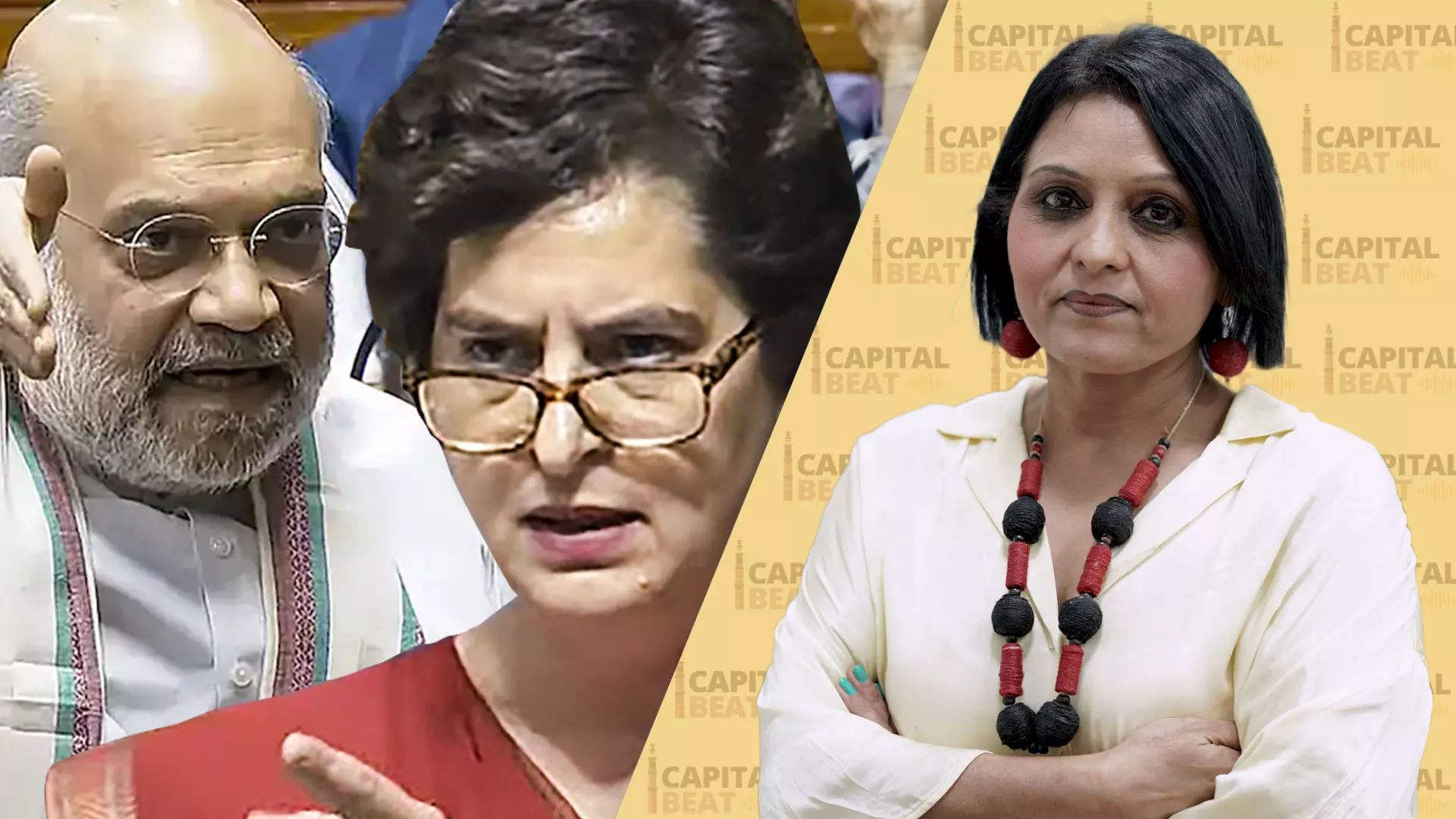
A discussion on Parliament debate about Operation Sindoor
Did Modi govt answer all questions on Op Sindoor in Parliamentary debate?
Amit Shah explains Operation Mahadev, Priyanka Gandhi counters with sharp questions. Was the govt truly held accountable in Parliament?

A panel discussion on The Federal’s Capital Beat, featuring senior journalists Sharad Gupta and Vivek Deshpande, critically examined the Parliament debate on Operation Sindoor and the government’s response to the Pahalgam terror attack. The discourse focused on whether the government addressed opposition concerns, the nature of military directives, and implications for political accountability.
Opposition questions on security lapse and ceasefire remain
During the Lok Sabha debate, opposition leaders, including Rahul Gandhi and Priyanka Gandhi, raised questions about the intelligence failure that led to the Pahalgam attack and the absence of security forces at a tourist site previously endorsed by the Prime Minister as safe. They demanded clarity on why heads had not rolled following the attack and why the government halted military action after asserting Pakistan had been brought to its knees.
The government’s response has not included specific details on the number of jets downed or clear explanations for the lack of accountability. As per the transcript, neither the Home Minister nor the Defence or External Affairs Ministers directly addressed these critical concerns.
Accusations of political misuse of armed forces
Rahul Gandhi alleged that Operation Sindoor was politically motivated to boost Prime Minister Narendra Modi’s image. He contrasted the current government’s handling of the situation with Indira Gandhi’s approach during the Bangladesh war, claiming that the armed forces were then given complete operational freedom, unlike now.
He also challenged the Prime Minister to respond to former U.S. President Donald Trump’s repeated claims about brokering a ceasefire, demanding a public rebuttal in Parliament. No response from the Prime Minister was recorded during the session covered by the debate.
Priyanka Gandhi counters BJP rhetoric with accountability questions
Priyanka Gandhi’s 28-minute speech focused on the lack of accountability, referencing the resignations that followed the 26/11 Mumbai attacks. She questioned why no similar resignations occurred post-Pahalgam. She highlighted that despite the attack happening under the current government’s watch, no official had been held responsible.
“During 26/11, the Maharashtra Chief Minister, the Home Minister of India, and the State Home Minister all resigned. But after Pahalgam, no heads rolled,” she pointed out.
Ceasefire and foreign policy contradictions flagged
The discussion brought attention to the lack of condemnation of Pakistan by international actors despite India’s diplomatic outreach. Rahul Gandhi criticized the External Affairs Minister for failing to secure strong global statements against Pakistan, despite evidence of Pakistani involvement in the Pahalgam attack. He also raised concerns about India's continued trade negotiations with China, despite allegations of Chinese intelligence aiding Pakistan.
The panel noted the contradiction between India's diplomatic stance and its ongoing economic engagements with China. Sharad Gupta highlighted the inconsistency in policy given the government's public narrative of national security threats.
External Affairs Minister’s statement scrutinised
Minister of External Affairs S Jaishankar was cited in the debate as stating that there was no direct communication between Modi and Trump during the period of the operation. The transcript noted that this statement was interpreted as groundwork to insulate the Prime Minister from Trump’s ceasefire claims.
“The External Affairs Minister stated there was no communication between Prime Minister Modi and President Trump from March to June,” Sharad Gupta noted.
Ideological rift surfaces in Parliament exchanges
During Priyanka Gandhi’s address, members of the treasury benches were heard interrupting her with shouts of “Hindu kahiye,” as she read out the names of the victims. This moment, according to the panelists, revealed a shift in the ruling party’s ideological stance from prioritizing “Bharatiyata” to emphasizing religious identity.
The debate underscored a departure from earlier RSS narratives, where “Bharatiya” took precedence. This ideological shift, now evident in Parliament discourse, may shape future political confrontations.
Political fallout ahead of Bihar polls
With the Bihar elections on the horizon, the panellists discussed how the BJP may use Operation Sindoor as a key campaign theme. Despite unanswered questions on lapses and outcomes, the party is expected to project the operation as a demonstration of Prime Minister Modi’s decisive leadership and nationalistic credentials.
The opposition, on the other hand, is likely to continue pressing for transparency and accountability, especially on issues of intelligence failure, lack of security at civilian sites, and the direction of military operations.
Review mechanisms still absent
The panel compared the government’s response to Operation Sindoor with past national security incidents like the Kargil War, which led to the establishment of the Kargil Review Committee. No similar mechanism has been announced following the Pahalgam attack. The absence of an official review has prompted questions about transparency and institutional learning.
The discussion concluded with renewed calls for clear answers from the Prime Minister, especially regarding the decision-making process that governed India’s limited retaliation and the lack of institutional accountability post-attack.
The content above has been transcribed from video using a fine-tuned AI model. To ensure accuracy, quality, and editorial integrity, we employ a Human-In-The-Loop (HITL) process. While AI assists in creating the initial draft, our experienced editorial team carefully reviews, edits, and refines the content before publication. At The Federal, we combine the efficiency of AI with the expertise of human editors to deliver reliable and insightful journalism.

